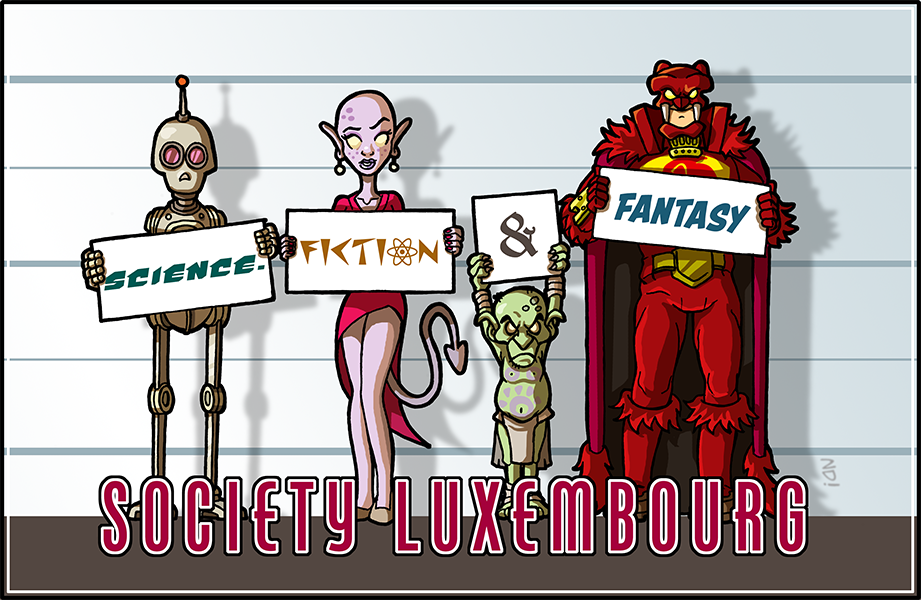Versalzen Blimmercher

(Text by Ognyan ‘Flame’ Darinov)
Henri Schaultes broke one of his most sacred traditions today. When he sat down for his morning coffee in his spacious kitchen, he decided, almost like a maniac, that this morning he wouldn’t read the news in French. Instead, he’d do so in a language that he could speak perfectly fine, but could never keep up with how it was written. The little red app on his big black tablet opened a medium-sized window: Nuwellen op Lëtzebuerjerschen.
Yes, it had been almost a century since they decided to call it Lëtzebuerjerschen. The other forms were all obsolete. In older texts you could find historical spellings like Lëtzeburejen, Lëtzebuergesch, but they were in disuse. Funny how easy some things are to change. But in any case, Schaultes was one of those immutable people. He insisted on his name being spelled the same way for over three centuries now.
Tense from the reading, Henri slammed his white mug on the coaster and closed the tab. He went back to the homepage and chose what he knew best: Nuwellen op Francës. At least those didn’t go around changing every year. Here we go: something about prices going up or down, something about birth rates going up or down. Everything was in order. Such was life in Luxembourg, after all: the good numbers kept rising, the bad ones kept falling.
Henri barely remembered anything from the first century of his life. He maybe remembered the name of the street where he grew up, the precise week when his mother passed, and, if he tried hard enough, the day he met Sofia. It was rainy, or maybe cloudy. Sofia was the only good thing that day. There was warmth, there was kindness, and perhaps a kiss at the end.
The kitchen door opened and, as usual, a strong draught let it echo like a bolt of thunder that brought life to dead stillness. Henri’s wife entered the room. Her eyes glimmered sadly in the morning light when she greeted him. She passed him the smile he was hoping to see. It disarmed him, bringing peace for another day, like a white flag waving in the tense air of a battlefield.
Her and Henri couldn’t peel a word to each other, Sofia thought. They deserved only pity.
Yet another three weeks of silence. For Henri, it probably didn’t feel any different. He was forgetful like that. But Sofia remembered and wrote down everything. She knew Verëmmersonndeg was fast approaching, and shortly thereafter was Hanneren (once known as ‘Ouschteren’). These were the traditions that let her and Henri savour the long weeks of silent marriage in their eternal bond.
Sofia turned on the coffee machine and closed her eyes as it buzzed. She thought of that wretched flower. Ëmmerbluemm… a beautifully cursed name. What else would you name a flower that carries petals delicately cobalt, sturdy and elegant, like the chrysanthemum? The fruits of these blue mums, if consumed every year, can bring a person’s lifespan to what was once biblical folly.
Her and Henri had been using it for three-hundred and sixty years, or somewhere thereabout. Since they were spouses, they had the right to eternal life, gifted and sanctified by the state. Yes, yes: the institution of marriage granted immortality, which could only be reaped in a happily wedded couple.
Marriage gave her and Henri a happy life, of course. Why wouldn’t they want to be married forever and beyond?
𓆣
Sofia was tired of seeing her friends die. She had four generations of unmarried friends pass away from old age, and she couldn’t forget them. The day they died, she wrote down their names and every cherished memory she had of them. The first three always stuck out.
The first one was Daria, who never mentioned her last name. She was also a foreigner. Sofia and Daria studied French together every Thursday, and eventually Luxembourgish on Mondays. They laughed and cried in frustration, sometimes skipped class together. The girl was beautiful, but she never found any man to marry.
Then there was Yve Perec. They met at a wine tasting event for couples, and weren’t particularly close at first. Yve was wedded for about five years, but then left her husband and never remarried. Very few would gamble for eternal life with a divorcee. Sofia and Mlle Perec grew closer only after the latter separated, after the years started counting.
The third friend Sofia lost was heart-breaking. After that one, she stopped writing down the bad parts. When Sarah Steichen took her last breath, Sofia was there holding her hand. And she cried more tears for Sarah than could ever be cried for Henri.
By now, it had been almost four centuries since Sofia moved to a country where the good numbers go up and the bad ones go down. Every year the number of new-borns would go up (or down), car-ownership would go up (or down), prices would go up (or down), death would go up (or down).
Marriages would only go up. The number of singles, woefully childless, would go down. The number of Sofia’s friends would go down.
𓆣
When Verëmmersonndeg came around, Sofia woke up very early, alone in bed.
She sat there for a long time. She sat for what seemed longer than the decades she had lived in Luxembourg. She was dreaming awake, like usual. She dreamt away old life, hoping to invite something new. Her intrusive thoughts were twilighting, never to manifest but never leaving either.
Henri knocked and gently opened the door. He brought her a café au lait with a dark-coloured pretzel. The blue petals lay dead flat on the baked dough. So many lifeless petals, so much given for her and Henri. Sofia held back tears and looked at her husband, struggling to break a smile.
Henri had been a handsome man three and a half centuries ago, and he still was. He loved the quiet life as much as he loved his wife, and he refused to see much beyond that. Quiet always meant peace, comfort always meant well-being, isolation always meant privacy. She wanted to say something, but he spoke first.
Du erënners dech wisou mir dat doe maache, nee? Du wiers net frou wann dat doen ophällt, he said, squeezing her hand. He stared at her with expectation. Sofia closed her eyes, insulted and angry.
She glanced at the pretzel again. Each petal was a person she had seen pass away. She felt guilty, she felt angry. She wanted to die, she wanted to kill.
𓆣
Sofia Schaultes (née Madrovska) broke one of the most sacred traditions today. When she prepared the egg-shaped pastry for this year’s Hanneren, she did not put in the Ëmmerbluemm. But she did put some blue petals in the dough. They were forget-me-nots.
What was it about her that she wanted Henri to remember? He barely called her name anymore. It was always her, her and Henri.
The kitchen door once again roared like thunder. Sofia smiled, and her hint of sadness was imperceptible. She served her husband the unpoisoned yet unblessed Nodeemee, and could only think of how she would spend the last year of her life.
Happy Hanneren, Henri.


